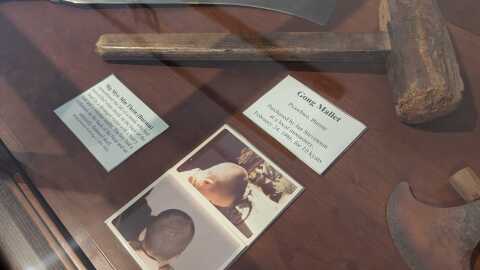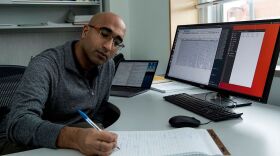Take a look at this week's top VPM News stories.
-
For nearly 60 years, this office has explored the nature of consciousness.
-
A sentencing hearing is set for Feb. 4 in Albemarle County Circuit Court.
-
Mull is a former U.S. ambassador to Poland and Lithuania
-
Similar percentages of legacy students enrolled this fall, data shows.
-
The policy updates came one day before the fall 2024 semester began.
-
UVA Health plans to launch new groups in August and September.
-
Theta Chi, Pi Kappa Alpha can't seek reinstatement until at least 2028, according to the university.
-
Head of Harrison Family Translational Research Center discusses advances in treatment.
-
Walsh earned the spot in a loaded field at the U.S. Olympic swimming trials on Sunday.
-
Since April 30, students and faculty had gathered at the Charlottesville campus in support of Palestine.
-
After the 2007 mass shooting at Virginia Tech, some colleges and universities enacted measures to keep campuses safe from gun violence.
-
Christopher Darnell Jones Jr., 22, was arrested in Henrico County.
-
A drug tested at UVA Health has now been fully approved by the U.S. Food and Drug Administration to treat severe COVID-19. Baricitinib, which was already being used to treat some autoimmune disorders like rheumatoid arthritis, now can be used for hospitalized COVID patients.
-
Researchers at the University of Virginia say for the first time they have experimental evidence that exercise can reduce the severity of macular degeneration.
-
Researchers at the University of Virginia School of Medicine are developing a new technique using focused ultrasound and a fluorescent drug together, to kill cells glioblastoma, the deadliest brain tumor. VPM’s Charles Fishburne talked with neurosurgeon Dr. Jason Sheehan about the disease and his promising new approach.
-
A UVA professor of psychology says Americans are stressed - but resilient.
-
COVID-19 deaths and infections could skyrocket in Virginia in the coming months if left unchecked, according to updated modeling from the University of Virginia.
-
As the World Health Organization declares coronavirus a global emergency, researchers at the University of Virginia are working on a massive genetic database they say will help detect and treat diseases in the future.




















